Activists, authors, and individuals with histories of incarceration discussed the racism and inequality surrounding the criminal “(in)justice” system in Students for Prison Education and Reform’s fifth annual conference, “Shadows of the Prison.”
SPEAR defined “shadows of the prison” as the “lesser-seen, under-discussed features of the criminal (in)justice system which impact human lives through the pervasion of carceral logics — punishment, supervision, violence, and control — beyond the prison’s walls and deep into ‘free’ society.”
Social activist Susan Burton shared her experiences with grief, incarceration, and recovery in the keynote address on April 13 at 4:30 p.m. Although Burton was named a CNN Hero in 2010 and is now the successful founder of the nonprofit A New Way of Life, through which she works with ex-convicts fighting problems of re-entry, in the past she struggled with experiences of abuse as a child, six incidents of incarceration, and the tragic loss of her five-year-old son.
After her son was accidentally run over by an Los Angeles Police Department car, Burton said, “My body would no longer contain the grief of everything.”
Shortly after, she began to take drugs in order to “smother [her] pain with smoke” and for the next 20 years she would be under the control of California Department of Corrections and Rehabilitation.
“I remember how degraded, how unnecessary I felt, how rejected and dejected and how hopeless I felt,” Burton said. “I remember laying in bed, trying to figure out if anything would ever change for me.”
In addition, Burton cited the story of a woman, Ingrid, to illustrate the consequences of pervasive racism within the criminal justice system. Ingrid had left her toddler asleep in the car with the windows rolled down for air, and she was subsequently arrested for child endangerment, although the child was unharmed. Ingrid was found guilty in front of all juries and lost custody of all three of her daughters.
“Had [Ingrid] not been black, would she have been sentenced to three years in prison, or given help?” Burton asked.

Moreover, once released, persons with histories of incarceration face discriminatory practices for the rest of their lives, Burton explained.
“It’s a lie that you get your freedom back once you leave prison gates,” she said.
Burton pointed out that not once did anyone think that Ingrid or herself needed help, or that rehabilitation might have been the answer instead of incarceration.
According to Burton, although the annual cost to offer rehabilitation services to one woman is $16,000, the cost of annual incarceration is $60,000. The decision for the justice system to continuously incriminate individuals instead of pursuing rehabilitation demonstrates ingrained racism, she explained.

The lack of help she received during her own struggles inspired Burton’s mission for A New Way of Life. Through a series of 12-step programs and peer support, the nonprofit has helped over 1,000 women reintegrate into their communities, retrieve custody of their children, and return to school and the workplace.
After Burton’s address, at 8 p.m., poetry ambassadors from Free Minds Book Club performed a selection of poetry on incarceration and achieving educational and career aspirations.
On April 14, lectures, panels, workshops, and performance talk-backs were held, with topics ranging from a lecture on the families of the incarcerated to a panel on punishment beyond the prison to workshops on the detention of immigrants.
One panel, “Agents of the Shadows: Police, Violence, and Control,” discussed the impacts of policing and the most effective alternatives to police. The panelists were Alex Vitale, sociology professor at Brooklyn College; Cobe Williams, deputy director of U.S. programs for the nonprofit Cure Violence; and journalist Eugene Puryear.
Vitale explained that a quarter of people killed by the police have mental health crises and that reforms for police training are ineffective. Complicit bias training, a popular training practice that aims to target inherent prejudices and proclaims success in laboratory settings, does not reproduce real-world results within police forces or employers’ hiring decisions, according to Vitale.
“[The training] is the perfect literal procedural reform [because] it fundamentally avoids the nature of the problem,” Vitale explained. “The problems with race and policing are not unconscious or unintentional.”
Vitale also pointed to the destructive effects of police presence within schools. He explained that in New York City, there are more NYPD personnel in schools than counselors.
“We don’t need police to be mentors to our students,” Vitale said. “We need no police.”
Rev. Teresa Smallwood presented the closing plenary, “Priests, Prophets, and Panthers: Hope for the Shadows.” Her repeated, impassioned cries to organize and work together to reform the criminal justice system echoed throughout the auditorium.
“Help those brothers and sisters who have been incarcerated and let them know that they are important to us,” Smallwood said, “because unlike what it looks like now, we are all in this together, so the day we say that we are family, we have nothing to lose but our chains.”
“Shadows of the Prison” was sponsored in collaboration with the Office of Religious Life and the University’s Campus Conversations on Identity and held on April 13–14 in McCosh Hall and East Pyne Hall.








